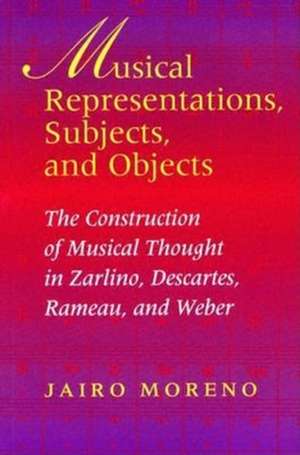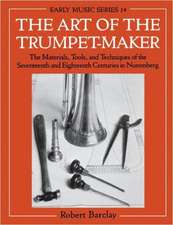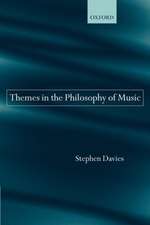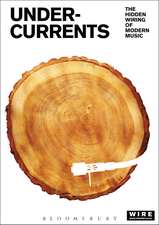Musical Representations, Subjects, and Objects – The Construction of Musical Thought in Zarlino, Descartes, Rameau, and Weber
Autor Jairo Morenoen Limba Engleză Hardback – 20 dec 2004
Musical Meaning and Interpretation Robert S. Hatten, editor"
Preț: 360.61 lei
Nou
Puncte Express: 541
Preț estimativ în valută:
69.01€ • 71.78$ • 56.97£
69.01€ • 71.78$ • 56.97£
Carte tipărită la comandă
Livrare economică 15-29 aprilie
Preluare comenzi: 021 569.72.76
Specificații
ISBN-13: 9780253344571
ISBN-10: 0253344573
Pagini: 256
Ilustrații: 13 b&w illustrations
Dimensiuni: 186 x 241 x 23 mm
Greutate: 0.56 kg
Editura: MH – Indiana University Press
ISBN-10: 0253344573
Pagini: 256
Ilustrații: 13 b&w illustrations
Dimensiuni: 186 x 241 x 23 mm
Greutate: 0.56 kg
Editura: MH – Indiana University Press
Cuprins
Acknowledgments
Note on Translations
Introduction
1. Zarlino: Instituting Knowledge in the Time of Correspondences
2. The Representation of Order: Perception and the Early Modern Subject in Descartes's Compendium musicae
3. The Complicity of the Imagination: Representation, Subject, and System in Rameau
4. Gottfried Weber and Mozart's K. 465: The Contents and Discontents of the Listening Subject
Epilogue
Glossary of Greek Terms
Notes
Bibliography
Index
Note on Translations
Introduction
1. Zarlino: Instituting Knowledge in the Time of Correspondences
2. The Representation of Order: Perception and the Early Modern Subject in Descartes's Compendium musicae
3. The Complicity of the Imagination: Representation, Subject, and System in Rameau
4. Gottfried Weber and Mozart's K. 465: The Contents and Discontents of the Listening Subject
Epilogue
Glossary of Greek Terms
Notes
Bibliography
Index
Recenzii
In this compelling and engaging study, Moreno (Duke Univ.) explores the notion that the developments of music theory are part and parcel of the philosophical conditions of a specific historical period, and that they can act as representations of a model of thinking outside the scope of aesthetic concern. Indeed, the author outlines the chronological relationships between the function of music theory, the act of music composition, and the production of music itself. Particularly interesting is Moreno's discussion of music theory's journey into and out of the realm of science and the related study of nature, which itself takes on a philosophical perspective. Replete with comparative examples from numerous music theory treatises and their contemporary philosophical discourses and religious thought, the author connects the various fields to one another under the common umbrella of the zeitgeist of each particular era. This rigorous text will be accessible only to scholars of music theory and philosophy, but it will become a milestone in the field, opening up a new area for comparative research. Summing Up: Essential. Graduate and research collections only. --J. Rubin, University of Minnesota--Duluth"Choice" (01/01/2005)
Descriere
A provocative application of Foucault's ideas to music theory














